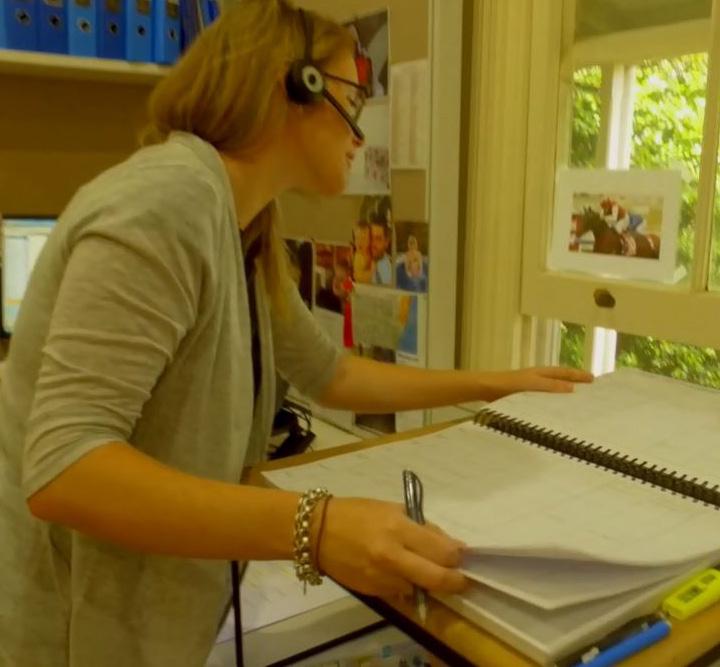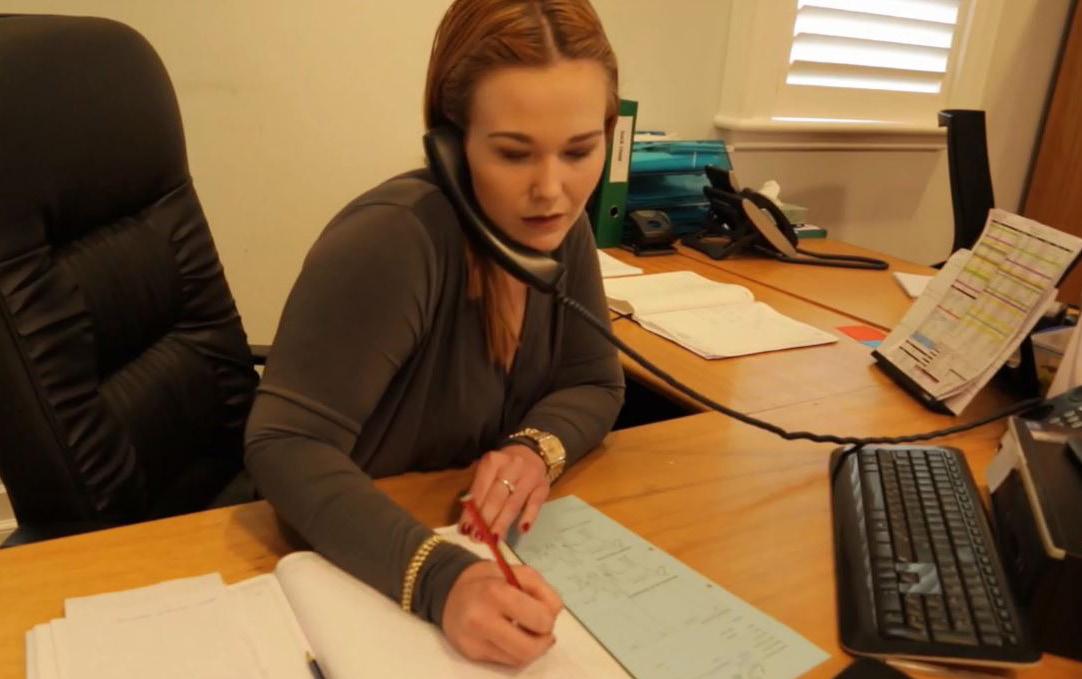
9 minute read
Business & Administration
Business & Administrative Roles
Stud Secretary Nominations Sales and Bloodstock Analysts Marketing Hospitality & Events Coordinator Communications & Client Relations Receptionist Human Resources Insurance Manager Work Health & Safety Officer Executive Assistant Management Accountant IT Manager Media
Stud Secretary
The role of a Stud Secretary is to ensure the day to day running of the stud office which is the central point of contact for clients wishing to book their mares into stallions or the monitoring of veterinary schedules relating to the breeding of mares. Stud Secretaries/Administrators will often also control the accounts and communications dependent on the size of the farm.
Daily tasks may include:
• General administrative duties such as speaking with clients, office admin including production of reports. • Daily administration of the farm record keeping system. This usually involves maintenance of computer programs or systems developed to record the veterinary notes regarding cycle of mares, stages of yearling and weanling preparation as well as foaling information. • You will also be required to produce reports to assist the stud manager in keeping track of the many horses on the farm. • Booking of client mares for service by a stallion. • Organisation of horse transport. • Some farms may also require their Stud Admin role to administer the accounts and financial records of the farm.

Nomination Sales and Bloodstock Analysts
A farm which stands stallions will usually have a ‘Nominations’ team. It is the role of the nominations team to work hand in hand with the marketing team to attract mare owners to their stallions. The nominations team are experts in the pedigrees of thoroughbreds and work to achieve the best mating between a mare and stallion in order to produce offspring that will fetch high prices for their owners at a sale and/or go on to make outstanding racehorses. Most nominations employees have worked their way to this rewarding career path and are passionate about the horses and the Thoroughbred industry.
Daily tasks may include:
• Studying and analysis of pedigrees. • Communication with clients (mare owners) and sales of stallion nominations (or mare bookings). • Inspection of foals, weanlings and yearlings which are progeny of the studs stallions. • This involves travel to broodmare farms and other studs not only around the Hunter Valley but to farms in other states of Australia as well as New Zealand. • Attending of all major sales in Australia and New
Zealand as well as other sales throughout the world. • Raceday attendances.

Marketing
As with any marketing role, it is the role of a thoroughbred farm marketing employee to promote the benefits of becoming a client of that farm. This will include the promotion of stallions, agistment and horses for sale.
Daily tasks may include:
• Production of promotional material such as flyers, brochures and merchandise. • Maintenance of the website and other communication streams such as social media. • Media liaison and Client liaison. • Event management. • Raceday attendance and hosting of functions at the racecourse.

Hospitality & Events Coordinator
Hospitality and event coordinators must be well-organized and competent in vendor management. Communication skills and attention to detail will set apart the best among the candidates, a shot of enthusiasm and passion for the job - that’s the ideal candidate.
The goal is to organize unforgettable events that will ensure the entertainment of clients and facilitate the completion of business objectives.
Daily tasks may include;
• Understand requirements for each event. • Plan event with attention to financial and time constraints. • Book venues and schedule speakers. • Co-ordinate suppliers (catering, decorators, entertainment.) and choose the best combination of quality and cost. • Manage all event operations (preparing venue, invitations etc.). • Do final checks at the day of the event (e.g. tables, technology) to ensure everything meets standards. • Oversee event happenings and act quickly to resolve problems. • Evaluate event’s success and submit reports.
Communications & Client Relations
The Communications Manager’s role is a career with a great variety of daily tasks which can include social media management, assisting with news stories and press releases, newsletters, marketing, client communication & support, stable visit co-ordination, assisting with website input and office support. Thoroughbred knowledge gained as a stud groom in horse breeding or in the racing industry, whilst gaining your skills with University or College qualification along with being able to effectively work as an individual and within a team is essential for this role.

Receptionist
A receptionist is the first point of contact for the company and provides administrative support across the organisation. They must handle the flow of people through the business and ensure that all receptionist responsibilities are completed accurately and delivered with high quality and in a timely manner.
Daily tasks may include:
• Welcome visitors by greeting, directing and announcing them appropriately. • Manage and forward any incoming phone calls while providing basic information when needed. • Receive and sort daily mail/deliveries/couriers. • Maintain security by following procedures and controlling access (monitor logbook, issue visitor badges). Update appointment calendars and schedule meetings/appointments. Perform other clerical receptionist duties such as filing, photocopying, collating and faxing. Resourceful and proactive dealing with issues as they arise.
Human Resources
The skilled HR Officer will recruit, support and develop talent through developing policies and management procedures. They are responsible for administrative tasks and contribute to making the company a better place to work. HR managers are passionate about people, highly efficient, committed and approachable individuals. Their goal is to provide excellent assistance and support to employees and managers.
Daily tasks may include:
• Support the development and implementation of HR initiatives and systems. • Provide counselling on policies and procedures. • Be actively involved in recruitment by preparing job descriptions, posting ads and managing the hiring process.
Insurance Manager
• Create and implement effective recruitment plans. • Develop training and development programs. • Assist in performance management processes. • Support the management of disciplinary and grievance issues. • Maintain employee records (attendance, EEO data etc.) according to policy and legal requirements. • Review employment and working conditions to ensure legal compliance.
Many horses and foals on the farms will be insured by the owners and offering to arrange the insurance for the clients is another part of the administration process. The insurance manager closely manages and monitors not only horses but also the farm’s workers compensation and business insurances. Typically, this role would be incorporated with other administration roles such as marketing, client relations or human resources.
Daily tasks may include:
• Managing veterinary reports for horses to be insured or • Processing and monitoring any insurance claims. • Office support.
renewed.

Work Health & Safety Officer
Working alongside the Human Resources and Insurance teams, the role of the Work Health & Safety Officer can often be incorporated with other roles like Assistant Stud Manager or Office Manager. A Safety Officer facilitates compliance with work health and safety (WH&S) guidelines. They provide advice on measures to minimise hazards or unhealthy situations and will also be on a constant lookout for violations. Work will be largely focused on incident prevention so you need to be conscientious and farsighted. The ideal candidate will also be detail-oriented and ready to act in emergencies. The goal is to establish a safe workplace according to legal standards and foster a culture of attention to health and safety for all employees and visitors.
Daily tasks may include:
• Support the development of WH&S policies and programs. • Advise and instruct on various safety-related topics (risk levels, use of machinery, chemicals etc.). • Conduct regular risk assessments and enforce preventative measures. • Initiate and organise WH&S training of employees and executives. • Inspect premises and the work of personnel to identify issues or non-conformity (e.g. not using protective equipment). • Oversee installations, maintenance, disposal of substances etc. • Stop unsafe acts or processes that seem dangerous or unhealthy. • Record and investigate incidents to determine causes and handle worker’s compensation claims. • Prepare reports on occurrences and provide statistical information to upper management.

Executive Assistant
An Executive Assistant supports high-ranking officials in the company by organising and maintaining the executive’s schedule and assisting them by performing a variety of administrative tasks. Executive Assistants must be professionals with great time-management and multitasking abilities. It is with their diligence and competence in their work that executives can focus on their managerial responsibilities without worrying for other tasks. The goal is to contribute to the efficiency of the overall business by ensuring all assigned administrative duties are carried out in a timely and efficient manner.
Daily tasks may include:
• Maintain executive’s agenda and assist in planning appointments, board meetings, conferences etc. • Attend meetings and keep minutes. • Receive and screen phone calls and redirect them when appropriate. • Handle and prioritize all outgoing or incoming correspondence (e-mail, letters, packages etc.). • Make travel arrangements for executives. • Handle confidential documents ensuring they remain secure. • Prepare invoices or financial statements and provide assistance in bookkeeping. • Monitor office supplies and negotiate terms with suppliers to ensure the most cost-effective orders. • Maintain electronic and paper records ensuring information is organized and easily accessible. • Conduct research and prepare presentations or reports as assigned.

Management Accountant
The role of a Management Accountant is to assist senior management in making critical business decisions by analysing and presenting key financial data, overseeing accounting procedures and preparing forecasts, budgets and risk analysis. An excellent management accountant must have an exceptional mathematical mind combined with a strong business orientation. You must be able to assume responsibility of cost accounting tasks and be both a strategist and a decision maker. The goal is to contribute to the decision-making process of management that will ensure business growth and long-term success.
Daily tasks may include:
• Gather and analyse financial information for internal use. • Support budgeting and funding. • Assist the company in managing its investment portfolio. • Assume responsibility of accounting procedures. • Evaluate the company’s performance using key data. • Make forecasts to assist business planning and decision-making. • Conduct risk assessment and advise on ways to minimise financial risk. • Advise on problems and suggest improvements. • Supervise lower-level personnel.
IT Manager
To obtain a role in information technology, you will need to have the necessary qualifications. It’s not a general requirement that you have a horse background, but if you have a passion for technology the horse industry, like many other industries, is becoming more reliant on keeping up to date with the latest digital age.
Daily tasks may include:
• Website management and design. • Digital media management. • Internet & Digital security. • Software design and updates. • Working with inter office locations.
Media

Race callers, journalists, photographers, film production agents, radio and television presenters all play a part in the promotion and latest information relating to our industry. Studs, sales companies and marketing teams rely heavily on current broadcasts of races, current events and statistics that the thoroughbred media produces. Even those that are passionate about the industry will follow media outlets to keep up to date with the latest in the industry.
Getting started in a thoroughbred media career takes passion, dedication, resourcefulness, determination and a and take you all over the world.
creative mind. A career in media can be fast paced, exciting










